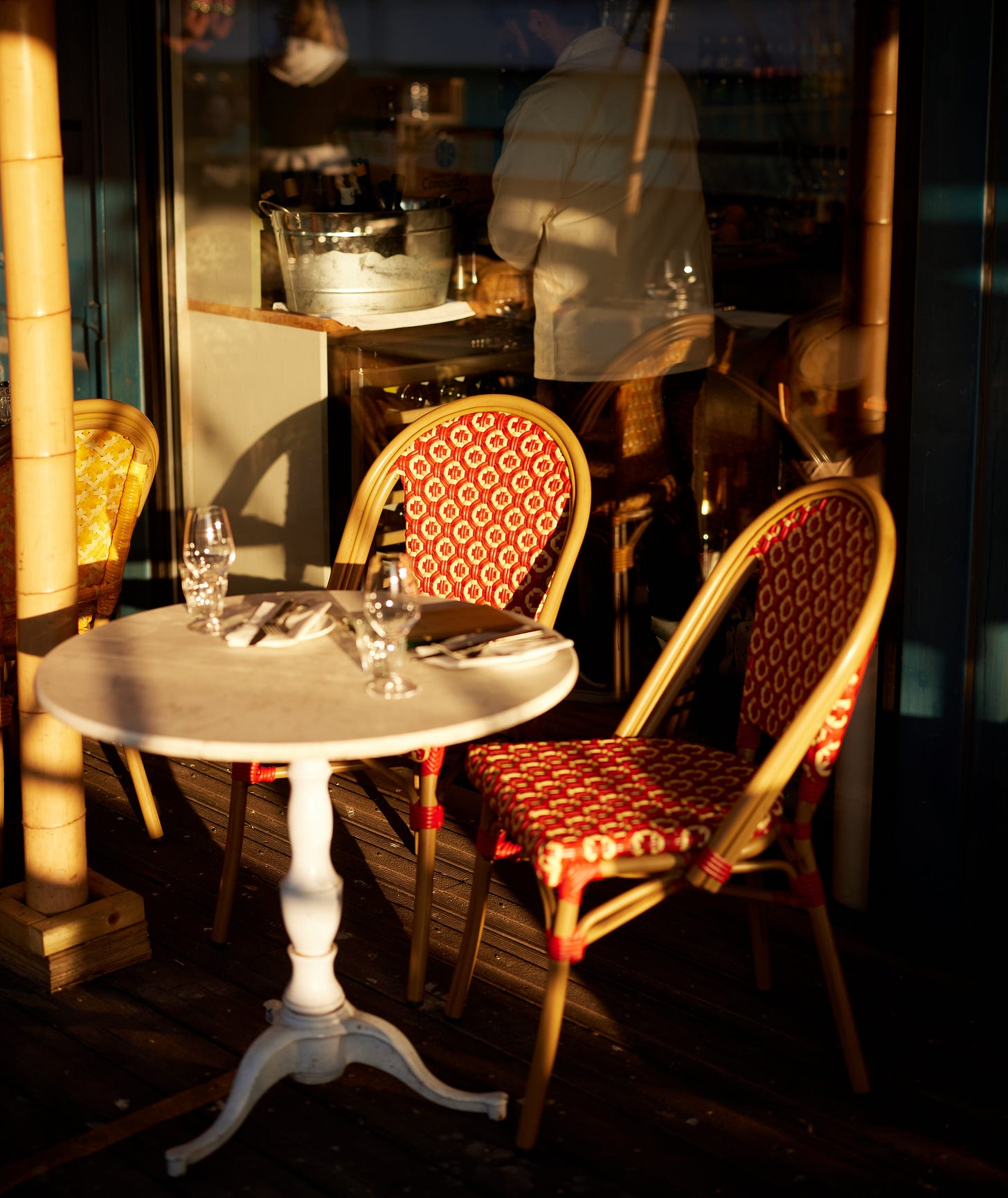The Next Table is Waiting
On timing, turnarounds, and the choreography of a night out
It’s 8:34pm. You’re swirling the last of your Tempranillo, deciding whether to sneak in a shared dessert. You arrived at 7:03 for your 6:30pm table. You’re annoyed I’ve just asked you to start wrapping up. I’m annoyed you made me ask. Neither of us says it out loud.
This is the bit diners don’t like to think about. That restaurants aren’t just warm, hospitable bubbles — they’re also clockwork operations. Every table, every booking, every course is part of a dance. And when someone misses a step, we all feel it.
Let’s pull back the curtain.
The Rhythm You Don’t See
When you book for 6:30pm, we’ve already done the maths. Your table is pencilled in for two hours — plus a 15-minute buffer, just in case. That gives you enough time for a relaxed dinner — not a rushed one, but not a marathon either. At 8:45pm, we’ve slotted someone else in. Maybe it’s their anniversary. Maybe they’ve been waiting patiently outside, coats zipped, dodging rain, hoping they don’t have to eat in a gale.
And sure, one late table might not sound like the end of the world. But three late tables and an unannounced assortment of allergies? That’s enough to knock us out of rhythm. Starters go out too fast to one table, too slow to the next. The kitchen starts second-guessing. Service wobbles. And we — the ones in the middle — have to smile through gritted teeth while internally rewriting the whole service.
Turn times aren’t about being stingy. They’re about fairness.
“No Rush” Is a Lie (and You Know It)
The biggest myth in modern dining? “Take your time.” We say it because it sounds lovely. It puts you at ease. But it’s conditional. “Take your time” means “enjoy yourself — within reason.” It doesn’t mean spend 30 minutes ordering because Becky can’t decide between burrata or bone marrow, then act surprised when dessert is no longer on the cards.
Some guests act as if the table becomes theirs indefinitely the moment they sit down. Like they’ve inherited it. Like we’re the unreasonable ones for gently reminding them there’s another party due at 8:45pm.
And I get it — you want to relax. You don’t want to feel like you’re on a stopwatch. But here’s the thing: we don’t want to rush you either. We want you to have a beautiful time. But we also need to be able to plan, to serve, and to be fair to the people who booked after you.
When you sit past your time, unplanned and unapologetic, the next table doesn’t get seated on time. That’s the real cost. Someone else’s evening starts with a delay, or worse, a disappointment.
A Night That Went Sideways
There was one night I’ll never forget — a Friday. Fully booked. First table arrives 28 minutes late. Lovely couple, full of charm, zero time awareness. We say nothing. We smile. We try to keep it breezy.
But we’re a small restaurant. No bar. No lounge. No plush holding pen with truffle crisps and mood lighting. Just a tightly packed dining room and a cold, wet street outside. You can ask someone to wait when it’s July and they’re in flip-flops, sun on their back. But not in mid-January, when there’s a yellow storm warning and their umbrella’s just turned inside out.
So when the next booking arrives bang on time, I’m stuck. I’ve got nowhere to seat them. I can’t park them at the pass. I can’t magic up an extra table. All I can do is apologise, buy time, and pretend this isn’t a car crash in slow motion.
By the time the late table finally leave, the next lot are irritable. Understandably. The kitchen’s behind. The pacing’s off. And the team are rattled because we’re now in reactive mode, not flow state. By the time the late table finally left, it added just enough delay to ripple through the rest of the evening. Not catastrophic, but enough to push the rhythm off, to keep us playing catch-up instead of cruising.
Hospitality With Boundaries Isn’t Bad Service
Somewhere along the way, we started equating good service with total surrender. The idea that saying no — or even not right now — is rude. But the truth is, the best restaurants have rhythm. Boundaries. Pacing that allows everyone to have a great experience.
That includes the people after you.
Being a good guest doesn’t mean tipping big and being charming. It means showing up on time. It means understanding that your night out is one of many we’re trying to deliver simultaneously. It means knowing that when we remind you of the turn time, we’re not being mean — we’re being honest.
Because we’d rather give you 90 great minutes than three hours of flustered, resentful chaos.
What It Really Comes Down To
Respect the rhythm. That’s all we’re asking.
Come on time. Order at a normal pace. Understand that your table has an expiry date — not because we’re trying to flip you like a burger, but because we’re running a delicate, barely-contained ballet. One where timing is everything.
And if you’re still hungry after, we’ll point you to the best late-night pudding spot nearby.
Just don’t act surprised when the lights start dimming and I hand you the bill with a tight smile and a “Hope to see you again soon.”
Because I mean it. I really do.




15 minutes with no call to explain? Your table is gone as far as my Restaurant is concerned.
If I'm going to my hairdresser or beauty salon, even five minutes late is a no no. It should be the same for restaurants. It's almost as bad as a no show.